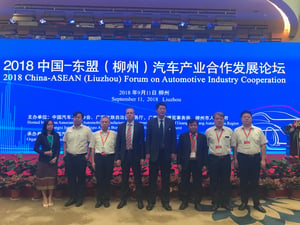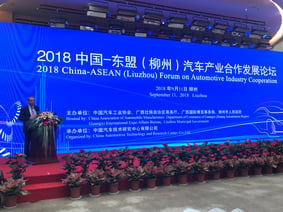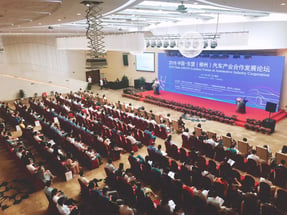
On September 11, 2018, the "2018 China-ASEAN Forum on Automotive Industry Cooperation" (CAFAIC) was held at the emerging automotive city of Liuzhou in Guangxi Province. This year's CAFAIC was sponsored by the China Association of Automotive Manufacturers (CAAM), Guangxi Department of Commerce, Guangxi International Expositions Bureau, and Liuzhou People's Government, and organized by the China Automotive Technology and Research Center (CATARC). As an international provider of testing, inspection and certification services, the TÜV Rheinland Group (TÜV Rheinland) was invited to take part in the forum as a guest speaker to provide participating businesses with an in-depth market analysis and comprehensive overview of the regulatory policies.
The purpose of the CAFAIC was to give local businesses a better understanding of the ASEAN automotive market and to build a platform for networking and cooperation between the automotive industries of China and ASEAN. During the forum, Xiaohong Sun (Secretary-General , automotive chapter of the China Chamber of Commerce for Import and Export of Machinery and Electrical Products, CCCME ), Qing Shen (Deputy Director, Automotive Industry Policy Research Center, CATARC), and Haifeng Chen (Deputy Director, Automotive Dealership and Post-Market Research Office, Policy Research Center, CATARC) all delivered very enlightening presentations on topics such as "The One Belt, One Road Initiative and Construction of Automotive Industrial Parks in ASEAN," "Future of China-ASEAN Cooperation on Automotive Production," and "Automotive Dealership and Post-Market Policy in China as well as Recommendations for the Development of the ASEAN Market."
Stefan Heuer, Vice President of TÜV Rheinland Asia Pacific Type Approval and Engineering, was also invited to attend the forum during which he provided an in-depth interpretation on the current state of the ASEAN automotive industry and regulatory trends. During his speech, Heuer mentioned that the growing awareness of environmental problems and the coming of Industry 4.0 means that China is now consolidating its importance as the manufacturing center for electric vehicles and their parts and components. ASEAN is now also moving beyond conventional automobile manufacturing sites to regional R&D centers with higher added value.


Progress on economic integration and the formulation of automotive technical regulations are some of the topics of the most interest to the audience. Here, Heuer stated that ASEAN plans to create a single market by unifying the automotive technical regulations and standards of its member states using the relevant United Nations agreements as a basis. Phase one of the process is now under way. The relevant regulations have not yet been passed but consensus has been reached on 10 out of the 19 technical standards in Phase 1. Differences still remain on the remaining 9 standards covering emissions, tires, seat belts and safety glass materials. As for Phase 2, there are 22 proposals that are on the request for comments and discussion stage. In addition to the market overview, in his speech, Heuer looked at the three major automotive consumer markets of Malaysia, Indonesia and Thailand. These three auto markets have used the ASEAN platform to build up their resources and are now exploiting their strategic advantages to develop new markets and achieve rapid growth.
Finally, Heuer offered some suggestions and opinions for Chinese companies looking to enter the ASEAN market. Generally speaking, the fast-growing markets in ASEAN offer excellent opportunities for Chinese companies. The governments of ASEAN member states currently offer very attractive incentives for foreign investments, as well, and their young workforce is very cost-effective. What they must pay attention to is the very varied regulations and cultures in ASEAN markets. Existing laws and regulations may not conform to the relevant UN agreements or EC/ECE. Multiple regulators may also be involved. Market access for some states or regional markets may require related testing (e.g. SNI, TISI). The complexity of the market environment means businesses may wish to obtain related technical services from a reliable third party.
For more information on our automotive testing and certification services, please visit our website.


